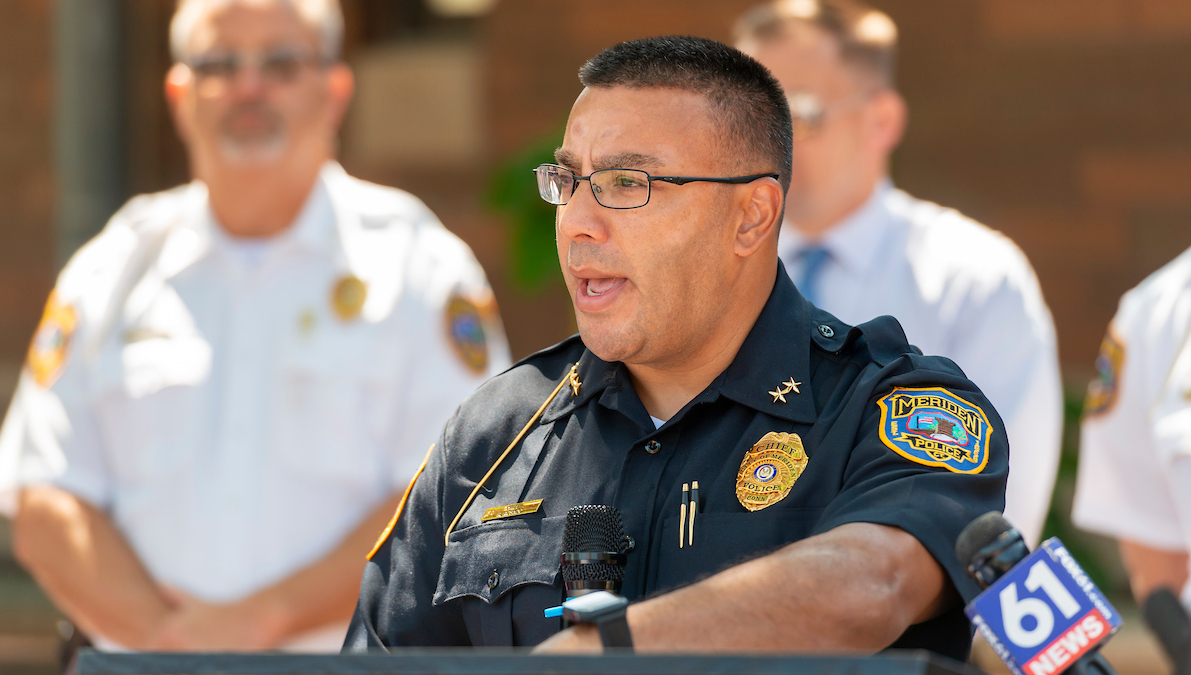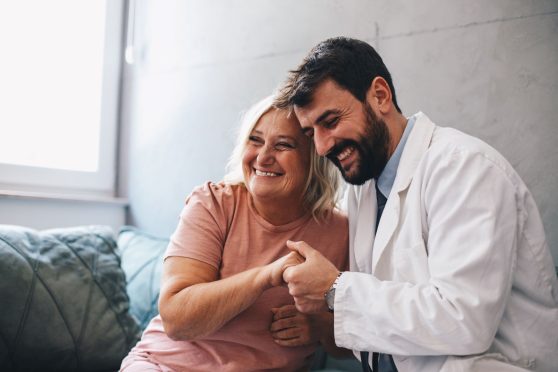Rushford will place a clinician in the Meriden Police Department, a collaboration designed to send more people into treatment instead of jail, the only partnership of its kind in Connecticut,
Rushford, part of Hartford HealthCare’s Behavioral Health Network (BHN), and the Meriden Police Department announced the initiative Friday at a press conference at the police station. The addition of clinical office space in the police’s Special Crimes Unit will enhance the existing Meriden Opioid Referral for Recovery (MORR) collaboration, offering crisis, addiction and mental health services to those in need.
“Our goal is to be proactive and conduct more outreach with Rushford clinicians,” said Meriden Police Chief Roberto Rosado, shown above at the press conference. “This will not only help us to identify individuals in crisis, but connect those individuals with clinicians who can bring forth immediate assistance. We currently make referrals to Rushford, and there have been many success stories.”
The partnership between Rushford and the Meriden PD began several years ago to combat the opioid crisis. The increased presence of a clinician at the station comes as opioid overdose deaths are at an all-time high across the country, fueled by the pandemic.
“This last year has been very challenging for all of us,” said Dr. J. Craig Allen, medical director at Rushford. “Beneath the pandemic has been an ongoing epidemic of substance use disorders and opioid overdoses. The stress, isolation and disruption of recovery and treatment programs have wreaked havoc on our community, especially those who suffer from substance use and mental health disorders.”
Dr. Allen added that Rushford has seen an increase in alcohol use, alcohol hepatitis and cirrhosis. In 2020, the United States saw a 30 percent increase in drug overdose deaths, the highest number ever recorded. Connecticut has experienced a similar trend, with a 14 percent increase in overdose deaths last year. This year, the numbers continue to rise. In Meriden, opioid overdose deaths doubled from 2019 to 2020.
“Over the years, I’ve seen firsthand the devastation and the effects of substance abuse and what our first responders encounter all the time,” said Gary Havican, president of Hartford HealthCare’s Central Region and former paramedic. “We can combat this issue and save lives through partnerships such as this.”
In 2018, Rushford began working with the Meriden Health Department to combat the opioid crisis through the development of MORR, a program funded by a Substance Abuse and Mental Health Services Administration (SAMSHA) grant. MORR connects individuals who have experienced an overdose or opioid-related emergency with Rushford clinicians to facilitate access to treatment and other resources that may not have been available to them.
Since the launch of MORR, 150 people who have overdosed in Meriden have been connected with treatment, said Jessica Matyka, clinical director at Rushford.
“Rushford clinicians currently respond to crisis calls with the police department,” said Matyka. “We also go on ride-along with police officers to help intervene in the moment. Adding a satellite office within the station will allow us to work more collaboratively, provide more support and respond quicker.”
Rushford clinicians will be on-site at the station during the week to provide crisis support, diagnosis, counseling and referral to treatment. The presence of a clinician will also allow the station to offer additional victim support services.
“When a detective interviews a victim of a special crime, they no longer have to hand over a pamphlet or a card with a phone number to call to receive support,” said Det. Sgt. George Clements. “Instead, they will be able to interface directly with a clinician who will be able to better support and assess and get them pointed in the correct direction of the services they might need.”
Rushford will also continue its partnership with the Meriden Police Department on the MERR program (Meriden Early Diversion, Referral and Retention). Launched in 2020, MERR is a grant-funded diversionary program that gives police officers an additional resource to use when an arrest may be avoided. A qualified individual would be better suited to receiving intensive mental health and/or crisis intervention treatment from Rushford’s clinical team.
Rushford and the Hartford HealthCare Behavioral Health Network offer Medication Assisted Treatment Close to Home (MATCH) programs for treatment of addiction to drugs or alcohol. Please call Rushford’s Access Center at 877.577.3233 to be connected to clinicians and resources.



